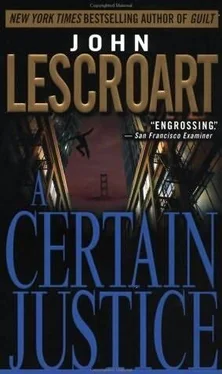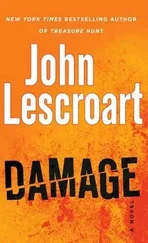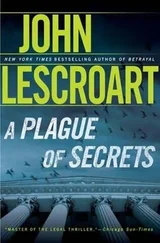John Lescroart - A Certain Justice
Здесь есть возможность читать онлайн «John Lescroart - A Certain Justice» весь текст электронной книги совершенно бесплатно (целиком полную версию без сокращений). В некоторых случаях можно слушать аудио, скачать через торрент в формате fb2 и присутствует краткое содержание. Жанр: Триллер, на английском языке. Описание произведения, (предисловие) а так же отзывы посетителей доступны на портале библиотеки ЛибКат.
- Название:A Certain Justice
- Автор:
- Жанр:
- Год:неизвестен
- ISBN:нет данных
- Рейтинг книги:3 / 5. Голосов: 1
-
Избранное:Добавить в избранное
- Отзывы:
-
Ваша оценка:
- 60
- 1
- 2
- 3
- 4
- 5
A Certain Justice: краткое содержание, описание и аннотация
Предлагаем к чтению аннотацию, описание, краткое содержание или предисловие (зависит от того, что написал сам автор книги «A Certain Justice»). Если вы не нашли необходимую информацию о книге — напишите в комментариях, мы постараемся отыскать её.
A Certain Justice — читать онлайн бесплатно полную книгу (весь текст) целиком
Ниже представлен текст книги, разбитый по страницам. Система сохранения места последней прочитанной страницы, позволяет с удобством читать онлайн бесплатно книгу «A Certain Justice», без необходимости каждый раз заново искать на чём Вы остановились. Поставьте закладку, и сможете в любой момент перейти на страницу, на которой закончили чтение.
Интервал:
Закладка:
To say Glitsky had an open-door policy at work would have been a misnomer – in fact, his office had no door. There used to be a door. Then, one day, it was removed to be varnished or painted or something and had never made it back. So anyone who desired an audience with the lieutenant could simply walk into the large room that held the twelve desks of the homicide-detail inspectors, turn left and pass into his inner domain – a fourteen-by-sixteen-foot area set off by dry wall.
There were two windows. From his desk, looking right, was the double-door entrance to the detail, a not-so-early warning system that told him – if he was looking – who might or might not be coming through his doorway in the next moment or two. In front, his view was not the touristy one seen on postcards of Baghdad by the Bay. Instead it featured a foreground of the old, pitted and cluttered desks of homicide detectives, an unpainted concrete column stuck with official department announcements, wanted posters, joke faxes that made the office rounds, pictures of male and female prostitutes, the occasional morgue shot, yellowing newspaper articles… the column was the detail's unofficial bulletin board.
Beyond the desks and the column was a six-foot window of crisscrossed panes, thick with grime, through which – when the fog allowed – one used to be able to spy the artery of the 101 Freeway, pulsing with life, and beyond that, the rooftops south of Market. At last, on clear days, in the distance rose the glitter-dome of Nob Hill, with its fabled hotels, architecture, history.
Now, and for the past two years, the view through the soot-stained panes consisted of parts of the second, third and fourth floors of the new jail, a truly hideous committee-designed incarceration unit, whose rounded glass and chrome exterior was somehow expected to meld aesthetically with the hulking gray box that was the Hall of Justice.
Just outside the detail was a small reception area that due to budget cuts had not been manned – or womanned – in four years, so that anyone who took a notion to could waltz directly in – both to the open area and to Glitsky's own office.
Glitsky loved it on television where the buzzer sounded and the lieutenant said 'yes?' and the receptionist – usually a twenty-something knockout in full makeup and no uniform – informed him that the mayor or the district attorney or Mr Flocksmith was there for an appointment, at which the lieutenant, sighing, said, 'Keep him on ice for a mo, Marcia, then send him in.' He really loved it.
Chris Locke was in the doorway, through it, and standing in front of Glitsky's desk, knuckles down on it, hovering, before the lieutenant had a chance to look up.
'I'd like a few words with you, Abe, you got a minute.'
'Come on in, Chris. Make yourself at home.'
Locke was alone, which was unusual. Glitsky wondered if he had gone home and gotten any sleep. He was dressed in his coat and tie as he had been in the middle of the night.
Glitsky started to lean back in his chair, to look up at the district attorney. It occurred to him, though, that Locke enjoyed putting people in this position, so instead he stood – Locke was a big man but Glitsky had an inch on him. 'Coffee, Chris? Tea?'
Locke wasn't buying the hospitality. 'Abe, I'm confused.'
'So am I, Chris. All the time. But I've stopped worrying about it.'
Locke took his knuckles off the desk. He was, Glitsky thought, one of those people who didn't like to stand unpropped, and no sooner had he straightened up than he half-turned and rested his hind quarters on the front of the desk.
Glitsky went into his best at-ease, hands clasped behind his back.
'I always thought we got along' – Locke began – 'and then this crap you drop last night about Jerohm Reese. I take it you didn't agree with my decision to let him go, even though he had no chance in hell of turning into a conviction.'
'Perhaps.'
'What does that mean?'
'It's a seven-letter word that means "maybe," Chris. I thought letting Jerohm go, after we went to the trouble of finding him, then arresting and booking him and all, seemed a little, well, precipitous.'
Locke picked a piece of Scotch tape off the roll on the desk, working it between his fingers. 'This is really about the lieutenant thing, isn't it?'
He was referring to the test the city gave, and which Glitsky had taken a year ago, to determine eligibility for promotion to lieutenant. While the candidates had waited for the results Locke had invited Glitsky up to his office and said he was going to use his pull to get him bumped to lieutenant even if he failed the test. He had gone on to explain that 'people of color' were discriminated against by the testing process, that Glitsky was a good cop and deserved the promotion even if his grades didn't measure up.
Glitsky had felt insulted by the assumption that he wouldn't pass (he got a ninety-seven, second highest among the candidates). Also, he didn't like the obvious politics of it – a mixture of backass affirmative action and loading up the police department with lieutenants for whom the DA had done 'favors.'
'A little of that, Chris,' Glitsky was saying. 'But mostly just plain old Jerohm Reese. And now, of course, the rest of it.' Glitsky raised his head, indicating the world outside.
Rolling the tape between his fingers, Locke sighed. 'Anything about Reese going to help us now?'
'You mean like arrest him again? I doubt it. But I thought it would help last night if we got some understanding of what might have started this whole thing.'
'What started this whole thing, Abe, was lynching Arthur Wade. And what's going to end it is finding the guy that led that mob.'
'You really think so?'
'Yeah, I do, Abe. Other people do, too.'
Glitsky took a breath, letting it out slowly. New to his so-called leadership role, he was still mostly a street cop in his heart – a protector of victims, a collector of evidence, the man who made the arrests. All of his training and experience was in enforcing laws and policies, not in making or interpreting them. But now, as head of a department, he caught a whiff of a change and it didn't smell too good. 'Well, as I mentioned last night, Chris, we're investigating it.'
Locke stepped closer and leaned over the desk. 'I don't know if that's going to do it, Abe. If that's going to be enough.'
13
Shea's hand was on the telephone.
He had pulled up a couple of the blinds so he could have a sense of what was happening outside. The television stayed on.
He had decided that there was really only one thing to do – call the police and turn himself in, tell them what had really happened. The longer he let this thing grow of its own accord, the more this crazy interpretation was going to be accepted as reality. He had to stop it now . He picked up the receiver.
The face of Philip Mohandas suddenly filled the television screen. Mohandas was the leader of the African Nation movement and the embodiment of the voice of African-American separatism. Shea had written an entire chapter of his thesis – Segregation to Integration and Back Again – on Mohandas and now the face on the screen caught all his attention. Like the mayor had earlier, Mohandas was speaking outdoors, live, in what looked like one of San Francisco 's projects. They punched up his voice in mid-soundbite.
'… we don't believe that the white man's government don't know who led the mob that murdered Arthur Wade. We don't accept their lies. We don't believe that there's any commitment to punish the guilty, because the truth is that the white man's law don't punish the white man. If we want justice, we're going to have to make it. If we want our streets back we're going to have to take them!'
Читать дальшеИнтервал:
Закладка:
Похожие книги на «A Certain Justice»
Представляем Вашему вниманию похожие книги на «A Certain Justice» списком для выбора. Мы отобрали схожую по названию и смыслу литературу в надежде предоставить читателям больше вариантов отыскать новые, интересные, ещё непрочитанные произведения.
Обсуждение, отзывы о книге «A Certain Justice» и просто собственные мнения читателей. Оставьте ваши комментарии, напишите, что Вы думаете о произведении, его смысле или главных героях. Укажите что конкретно понравилось, а что нет, и почему Вы так считаете.












